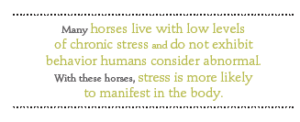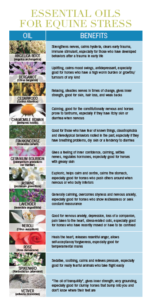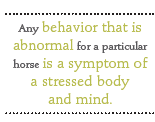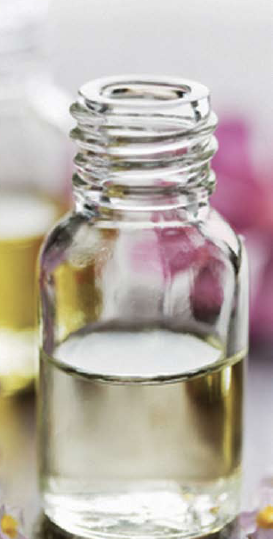In order to understand how we can use equine aromatherapy to reduce stress in horses, we must first understand what stress is and how it manifests. Stress is not just a mental phenomenon that produces behavioral problems. It is a physical response to perceived danger, whether the harm is an immediate danger, such as a predator, change of home, or something that upsets the body’s healthy balance, such as confinement or inappropriate food.
The “stress response” is a physiological cascade, triggered by anything perceived as a threat – physical or emotional, real or imagined. The hypothalamus causes the sympathetic nervous system to release adrenalin and other related hormones, which propel the body into a state of arousal. Metabolism, heart rate, blood pressure, breathing rate and muscle tension all increase, blood vessels to the skin are constricted, and digestion stops. The stress response also suppresses the immune system and inhibits short-term memory, concentration, and rational thought, while storing impressions in the emotionally loaded long-term memory.
This response is designed to give a short sharp boost when danger is present, preparing the body to fight or flee. This is followed by another release of hormones that stimulate the relaxation response once the stressor has gone, inducing feelings of euphoria.
Stress becomes “bad” when stressful situations are not short-lived and the urge to act (to fight or flee) must be suppressed, such as with a horse in a stable. Chronic stress leads to a wide variety of problems, from overreacting to things such as a move, to serious illness. Because the stress response has an impact on many bodily systems, if it does not turn off, the body never returns to “normal” and physical problems result.
 Identifying stress
Identifying stress
Some horses develop behaviors easily recognized as a stress response, such as stall-walking, cribbing and weaving. All these are stereotypical (an exaggerated or misplaced version of a naturally occurring behavior when that behavior is denied). Fearfulness and/or aggression are also signs of stress. But there are other indicators that can be easily overlooked, such as scratching and rubbing, bumping into you, “ticklishness”, lack of concentration or playfulness, running away, pawing and lack of eye contact.
The skin, the body’s largest organ, is often the first place to manifests signs of a system overloaded by stress. Common early signs are increased sensitivity to flies or midges, slow-healing wounds, poor quality coat and hooves, or fungal infections. If the stress is not reduced at this stage it is likely to move deeper into the body and start to affect internal organs, such as the digestive or circulatory systems. This often leads to colic, soft tissue damage, or mystery lameness. Chronic stress can also manifest as tumors or sarcoids, coughs, colds and allergies. Weight loss, or an inability to gain weight, are also signs of stress. A guardian who is alert to her horse will notice any changes in behavior, attitude or movement, find out what the cause is, and remove the stressor before it can develop into a more serious health problem.
 Essential oils to the rescue
Essential oils to the rescue
Essential oils have a wide range of actions, and can act as a sedative, nerve tonic, immune stimulant, relaxant and soother. Almost all essential oils reduce stress and increase immune responsiveness, working simultaneously on body and mind.
When a horse inhales essential oil, volatile molecules enter his olfactory system, pass through the blood/brain barrier and enter the limbic system of the brain, where the stress response also originates. Essential oils use many of the same pathways as the stress response, affecting the endocrine system which then affects organ function. In fact essential oils work very much like the “off” switch for the stress response – this is why they work so well for conditions such as stress related skin problems, even without being applied topically.
In cases of acute stress, such as Beau’s response to a change of home, essential oils can immediately calm the horse, lowering blood pressure, reducing heart rate, and generally helping the horse to focus and come back to his senses.
 Offering oils to a horse and allowing him to “self-medicate” further reduces stress as it puts the horse back in charge of his life. Through equine aromatherapy, you become attentive to your horse – you must be patient and present in order to facilitate the treatment, and follow your horse’s wishes as to how he wants to interact with the oils. And simply being together quietly builds trust and reduces stress for both horse and human.
Offering oils to a horse and allowing him to “self-medicate” further reduces stress as it puts the horse back in charge of his life. Through equine aromatherapy, you become attentive to your horse – you must be patient and present in order to facilitate the treatment, and follow your horse’s wishes as to how he wants to interact with the oils. And simply being together quietly builds trust and reduces stress for both horse and human.
Nayana Morag is one of the world’s foremost experts in the use of essential oils and aromatic extracts for animals. She has developed a system of animal wellness she calls Animal PsychAromatica, founded on the use of essential oils, understanding animal behaviour and the reduction of physical, environmental and psychological stress. Nayana also works with horses and owners to help them develop a positive, creative relationship based on trust and understanding. She teaches worldwide and also offers distance or on-site consultations, workshops and a professional standard Certificate in Animal PsychAromatica. For more information, visit essentialanimals.com or email nayana@essentialanimals.com.








